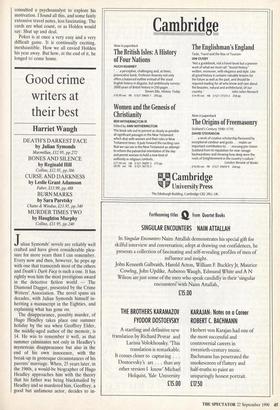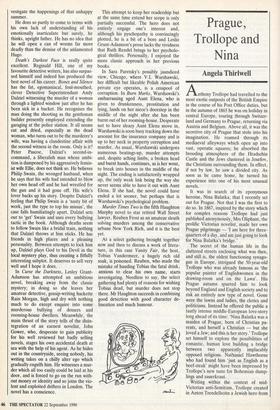Good crime writers at their best
Harriet Waugh
DEATH'S DARKEST FACE by Julian Symonds
Macmillan, 02.95, pp.272
BONES AND SILENCE by Reginald Hill
Collins, £12.95, pp.366
CURSE AND DARKNESS by Leslie Grant Adamson
Faber, £13.99, pp.488
BURN MARKS by Sara Paretsky
Chaito & Windus, £13.95, pp.340
MURDER TIMES TWO by Haughton Murphy
Collins, £11.95, pp.240
Julian Symonds' novels are reliably well crafted and have given considerable plea- sure for more years than I can remember. Every now and then, however, he pops up with one that transcends most of the others and Death's Dark Face is such a one. It has rightly won him the most prestigious award in the detective fiction world — The Diamond Dagger, presented by the Crime Writers' Association. The novel spans six decades, with Julian Symonds himself in- heriting a manuscript in the Eighties, and explaining what has gone on.
The disappearance, possibly murder, of Hugo Headley takes place one summer holiday by the sea when Geoffrey Elder, the middle-aged author of the memoir, is 14. He was to remember it well, as that summer culminates not only in Headley's mysterious disappearance but also in the end of his own innocence, with the break-up in grotesque circumstances of his parents' marriage. When, 25 years later, in the 1960s, a would-be biographer of Hugo Headley approaches him with the theory that his father was being blackmailed by Headley and so murdered him, Geoffrey, a good but unfamous actor, decides to in-
vestigate the happenings of that unhappy summer.
He does so partly to come to terms with his own lack of understanding of his emotionally inarticulate but surely, he thinks, upright father. He has no idea that he will open a can of worms far more deadly than the demise of the unlamented Hugo.
Death's Darkest Face is really quite excellent. Reginald Hill, one of my favourite detective writers, has also surpas- sed himself and indeed has produced the best novel of his career. Bones and Silence has the fat, egomaniacal, foul-mouthed, clever Detective Superintendant Andy Dalziel witnessing the murder of a woman through a lighted window just after he has been sick in a bucket. He recognises the man doing the shooting as the gentleman builder presently employed extending the garaging at the police station. It all seems cut and dried, especially as the dead woman, who turns out to be the murderer's wife, was having a clandestine affair with the second witness in the room. Only is it? Peter Pascoe, Dalziel's second-in- command, a liberalish man whose ambi- tion is dampened by his aggressively femin- ist wife Ellie, does not think so. He believes Philip Swain, the wronged husband, when he says that his wife had intended to blow her own head off and he had wrestled for the gun and it had gone off. His wife's lover backs up his story. Despite Dalziel's feeling that Philip Swain is a 'nasty bit of work, just the type to top his missus', the case falls humiliatingly apart. Dalziel sets out to 'get' Swain and uses every bullying tactic in the book. Although deaths seem to follow Swain like a bridal train, nothing that Dalziel throws at him sticks. He has friends in high places and a pleasing personality. Between attempts to lock him up, Dalziel plays God to his Devil in the local mystery play, thus creating a fitfully interesting subplot. It deserves to sell very well and I hope it does.
In Curse the Darkness, Lesley Grant- Adamson has attempted an ambitious novel, breaking away from the classic mystery; in doing so she leaves her amateur detective, gossip-writing hackette Rain Morgan, high and dry with nothing much to do except enquire into some murderous bullying of dossers and rooming-house dwellers. Meanwhile, the main thrust of the story tells of the disin- tegration of an earnest novelist, John Gower, who, desperate to gain publicity for his well reviewed but badly selling novels, stages his own accidental death at sea with the help of his agent. As he hides out in the countryside, seeing nobody, his writing takes on a chilly alter ego which gradually engulfs him. He witnesses a mur- der which all too easily could be laid at his door, and is forced to go on the run with- out money or identity and so joins the vio- lent and exploited drifters in London. The novel has a conscience.
This attempt to keep her readership but at the same time extend her scope is only partially successful. The hero does not entirely engage one's interest and, although his pyschopathy is convincingly plotted, he is a bit of a bore and Leslie Grant-Adamson's prose lacks the vividness that Ruth Rendel brings to her psycholo- gical thrillers. Personally, I enjoyed the more classic approach in her previous books.
In Sara Paretsky's possibly jaundiced view, Chicago, where V.I. Warshawski, her difficult but likeable Polish American private eye operates, is a cesspool of corruption. In Burn Marks, Warshawski's embarrassing aged Aunt Elena, who is given to drunkenness, prostitution and lying, lands on her niece's doorstep in the middle of the night after she has been burnt out of her rooming-house. Desperate not to have sleazy Aunt Elena move in, Warshawski is soon busy tracking down the arsonist for the insurance company and is up to her neck in property corruption and murder. As usual, Warshawski undergoes numerous beatings-up, murder attempts and, despite aching limbs, a broken head and burnt hands, continues, as is her wont, to break into houses in the middle of the night. The ending is satisfactorily wrapped up, the only weak link being the way she never seems able to have it out with Aunt Elena. If she had, the novel could have ended a lot sooner, but perhaps that is Warshawski's psychological problem.
Murder Times Two is the fifth Haughton Murphy novel to star retired Wall Street lawyer, Reuben Frost as an amateur sleuth solving murders among the conservative urbane New York Rich, and it is the best yet.
At a select gathering brought together now and then to discuss a work of litera- ture, in this case Vanity Fair, the host, Tobias Vandermeer, a hugely rich old
soak, is poisoned. Reuben, who made the mistake of handing Tobias the fatal drink, anxious to clear his own name, starts investigating. Needless to say, the select gathering had plenty of reasons for wishing Tobias dead, but murder does not stop there. Mr Haughton succeeds in combining good detection with good character de- lineation and much humour.



































































 Previous page
Previous page